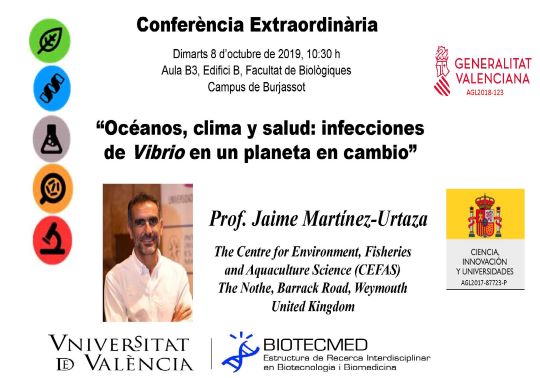
Extraordinary Conference next Tuesday 8 October 10:30 h in classroom B3, Building B, Faculty of Biologicals with the title "Oceans, climate and health: infections of Vibrioen a planet in change" by Professor Jaime Martínez-*Urtaza, Senior Researcher of the " Center *for *Environment, *Fisheries *and *Aquaculture *Science (*CEFAS) (*Weymouth. *UK)
On Tuesday, October 8, at 10:3 p.m., an Extraordinary Conference will take place in Classroom B3 of the Faculty of Biology (Burjassot Campus), within the BioTecMed Conference Cycle, which will address the influence of climate change on diseases infectious diseases caused by marine bacteria of the genus Vibrio. The conference will be given by Professor Jaime Martínez-Urtaza, Senior Researcher at the Centre for Environment, Fisheries and Aquaculture Science (CEFAS) (Weymouth). RU) and is sponsored by the AICO/2018/123 projects of the Generalitat Valenciana and AGL2017-87723-P of the Ministry of Science Innovation and Universities, both on the pathogen Vibrio vulnificus, popularly known as the "marine meat-eating bacteria". Professor Jaime Martinez-Urtaza works on different aspects related to food security and the epidemiology of food and water borne diseases. He has previously worked as a professor at the University of Santiago de Compostela, as an expert researcher on water and food borne diseases at the European Centre for Disease Control (Sweden) and as a researcher-researcher, expert on genomics and phylogenomics at the Milner Centre for Evolution at the University of Bath in the United Kingdom. He is an honorary professor at the University of Exeter (United Kingdom) and visiting professor at the University of Southampton (United Kingdom), the University of the Border (Chile) and the Food and Development Research Centre-CIAD (Mexico). He is also a scientific advisor to the National Institute of Health of Peru and an active member of the ECDC European Environment and Epidemiology (E3) Network and the international initiative The Lancet Countdown on Health and Climate Change.
His work covers different aspects of molecular epidemiology and the effects of climate on infectious diseases with a particular interest in the study of water and foodborne diseases. A central theme in his work is the fusion of different scientific disciplines such as molecular biology, microbiology, population genetics, oceanography, climate sciences and epidemiology, to decipher the dynamics of pollution in the environment and in the onset of diseases. In recent years he has devoted much of his activity to the application of advanced genomic tools to identify new aspects in the evolution and dispersal of pathogenic human bacteria with a particular interest in the reconstruction of history the spread of human pathogens in connection with natural or associated events with human activity. His work has been published in journals such as New England Journal of Medicine, Lancet, Nature Climate Change and Nature Microbiology.







